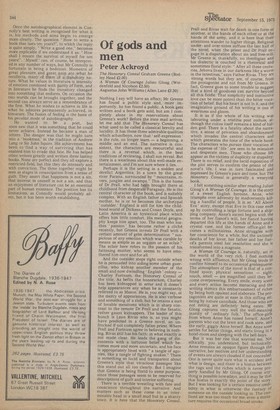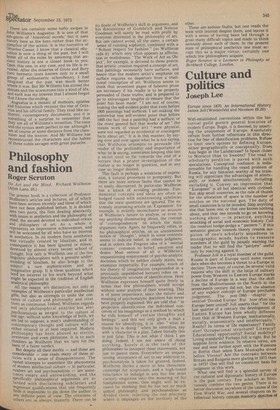Of gods and men
Peter Ackroyd
The Honorary Consul Graham Greene (Bodley Head E2.00) A Woman Of Courage Julian Gloag (Weidenfeld and Nicolson £2.50) Augustus John Williams (Allen Lane £2.50) Nothing I say will have an effect; Mr Greene has found a public style and, more importantly, he has found a public. A book gets written and a book gets sold, but am I completely alone in my reservations about Greene's work? Before the irate mail arrives, let me add that The Honorary Consul has what used to be called a classical brevity and lucidity. It has those three admirable qualities which schoolboys, now that ' self-expression ' is the rule, no longer learn — a beginning, a middle and an end. The narrative is consistent, the characters are resourceful and there is a reversal which, in the best traditions of reviewing, I shall not reveal. But there is a weariness about this well-made entertainment, and I'm not sure where it lies.
Perhaps it is the setting in a sodden and derelict Argentina. In a town by the great river Parana, surrounded by "mountains, rivers, jungles and swamps." This is the home of Dr Prall, who had been brought there at childhood from desperate Paraguay. He is the central character of the book, and is suitably complex. With an English father and Spanish mother, he is or he becomes the archetypal ' outsider.' England is still for him the childhood world of Dickens and Conan Doyle, and Latin America is an hysterical place which offers him little comfort. His mental geography keeps him apart, too. The man who loathes ' passion ' has become rather a cliché recently, but Greene invests Dr Prall with a certain amount of grim determination: "suspicious of any emotion which was curable by means as simple as an orgasm or an eclair." The eclair here refers to the passion of his fattening mother, who seems to have smothered him once and for all.
And the outsider steps right outside when he is persuaded into aiding some urban guerrillas, who kidnap another member of the small and now dwindling' English 'colony — Charley Fortnum, the Honorary Consul of the title. As befits the honorarium, Charley has been kidnapped in error and it doesn't help appearances any when he is constantly referred to as Mason. He is, you might say, at the mercy of appearances. He is also verbose and something of a slob, but he retains a sort of lovable messiness which is in sharp contrast to the remote Dr Prall and the fanatic, rather gaunt kidnappers. The leader of this bunch is Leon Rivas who is, as you might have predicted in a Greene novel, an unfrocked if not completely fallen priest. Where Prall and Fortnum agree in believing in nothing, Rivas still has his faith: in what exactly is not made clear. He leads the gang of discontents with a tortuous belief which becomes more and more uncertain, and his face is appropriately lined with "a tangle of agonies, like a tangle of fighting snakes." There is something so lucid and transparent about Greene's style that vivacious passages like this stand out all too clearly. But I imagine that Greene is being florid to some purpose, since these passages seem to be reserved for descriptions of guilt and interior suffering.
There is a terrible wrestling with fate and conscience throughout the narrative. And matters such as these come to an interminable head in a small mud hut in a shanty town. It is here that the Honorary Consul,
Prall and Rivas wait for death in one form or another, at the hands of each other or at the hands of the army, and it is here that their attentions wander to higher things. Religious underand over-tones suffuse the last half of the novel, when the priest and Dr Prall
gage in a disputation about sin and free-will. Mr Greene is, thankfully, no theologian and his dialectic is couched in a rhetorical and sometimes florid style: " After all these centuries, Jehova lives in our darkness like a worm in the intestines," says Father Rivas. They are strong words but they are, of course, from the protagonist and not from Mr Greene. In fact, Greene goes to some trouble to suggest that a kind of goodness can survive beyond all this fiddle. That simplicity and instinctive love can be more potent than the bitter vocation of belief. But his heart is not in it, and the imaginative ground of his writing is one of Weariness and gloom.
It is as if the whole of his writing was labouring under a tristitia post coitum, although the coitus itself remains a kind of hidden god. There is a fatality about the narrative, a sense of privation and abandonment which invades the central characters and which generates the tone of the whole book. The characters who pursue their vocation at the expense of ' life ' are seen to be mistaken and desperate men. Those who choose life appear as the victims of duplicity or stupidity. There is no relief, and the lucid exposition of the plot serves to confirm the prison of the novel's life, I was in turn fascinated and depressed by Greene's pace and tone, but The Honorary Consul is generally a wearying book.
I felt something similar after reading Julian Gloag's A Woman Of Courage. It is the story of a sweet English heroine, Anne, who triumphs over adversity by inadvertently killing a handful of people. It is an 'All About Eve story, except that Eve in this case ends up by controlling a large fortune and a shipping company. Anne's ascent begins with the terms of her fiancé's will, her fiance having departed this life at the hands of Anne and a crystal vase, and the former office-girl becomes a millionairess. Anne struggles with her conscience for a while, but the untimely deaths of her lover, her father and her fiancé's parents steel her resolution and she is transformed into a magnate. A Woman Of Courage is, naturally, set in the world of the very rich. I find nothing wrong with affluence, but Mr Gloag tends to confine himself to its occasional grotesquerie. The atmosphere of the novel is that of a confined space; physical sensations — sight, touch, smell — are magnified until they become overpowering. Every smile, every scent and every action become menacing and the writing mimics this embarrassment of riches by being both opulent and elaborate. The protagonists are quite at ease in this stifling air, being by nature cannibals. And those who are not eating are definitely being eaten: Mr Gloag captures very well the well-meaning inanity of 'ordinary folk.' The office-girls from whom Anne has raised herself, Anne's parents who cut the lawn and cook stew, and the early, giggly Anne herself. But Anne soon settles for better things, and starts living in a hotel-room and sleeping with the bell-boys. But it was her rise that worried me. No1 ethically, you understand, but technically. Anne remains an opaque figure through the narrative, her motives and her understanding of events are always clouded if not concealed. One is never quite sure what is accident and what is design. and there is a hiatus between the rags and the riches which is never properly handled by Mr Gloag. Of course anYthing is possible nowadays, and it may be that this hiatus is exactly the point of the story. But I was looking for a certain emotive credibility in what is otherwise the fantasy of someone on the outside looking in. The confined air was too much for me, even a miniature requires the occasional broad stroke. There are certainly some hefty swipes in John Williams's Augustus. It is one of that sub-genre of ' historical novels,' but it uses history here as the hero rather than the accomplice of the action. It is the narrative of Octavius Caesar. I know that a classical education is now a thing of the past, but I will break all of the rules by assuming that ancient history is not a closed book to you. Open this one, in any case, and its life is revealed. After the miseries of Grote and Bury (two hermetic texts known only to a small group of enthusiastic schoolboys), I had imagined that the past was much better Where it was. But Mr Williams has stirred the statues and the scarecrows into a kind of life, and such was my interest that I almost forgot that I knew the ending. Augustus is a mosaic of memoirs, epistles and histories which recount the rise of Octavius and his official family. They read like authentic, contemporary documents, and it is something of a surprise to remember that they are all of Williams's invention. The tone and the syntax seem perfect to me, although I ant of course at some distance from the classroom and the lexicon. And Mr Williams has reconstructed the .characters and the habits of these noble savages with great panache.

































 Previous page
Previous page